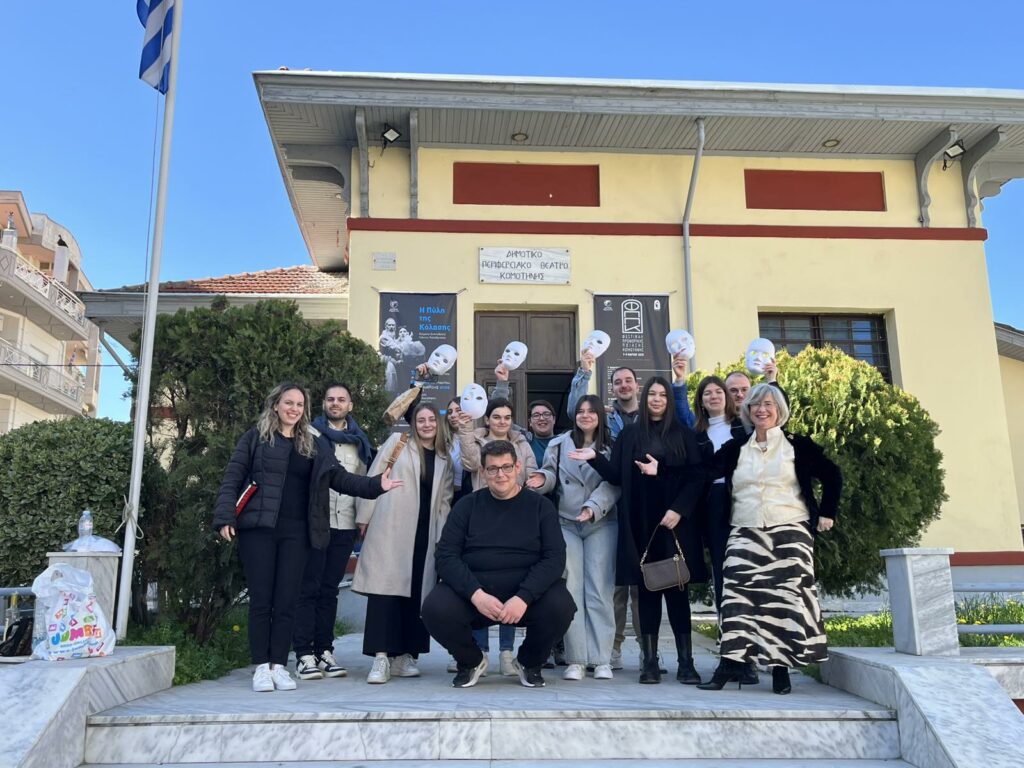Η διαδικτυακή ομιλία του ομ.καθηγητή κ. Μενέλαου Χριστόπουλου θα γίνει την Παρασκευή 9/5/ 2025 στις 7μμ στον ίδιο σύνδεσμο
9.5.2025 Mενέλαος ΧΡΙΣΤΟΠΟΥΛΟΣ
Πανεπιστήμιο Πατρών
menchris@upatras.gr
ΤΙΤΛΟΣ Ομόκλινες του εχθρού: αιχμάλωτες πολέμου στο αρχαίο ελληνικό έπος και δράμα
ΠΕΡΙΛΗΨΗ
Στην παρουσίαση αυτή θα εξετάσουμε το θέμα της .δορίληπτης. ομόκλινης που
αιχμαλωτίζεται στο πλαίσιο ενός πολέμου, σε συνδυασμό με τις έννοιες της δουλείας, της
μετοικεσίας, της ικεσίας, του γάμου και του βιασμού, έννοιες που, όπως προκύπτει,
τέμνονται πολλαπλά με την ιδιότητα της ομόκλινης αιχμάλωτης. Θα εξετάσουμε ειδικότερα
το θέμα αυτό σε σχέση με τις περιπτώσεις της Ανδρομάχης, της Ελένης, της Μήδειας και της
Κασσάνδρας προσπαθώντας να ανασυνθέσουμε μία τυπολογία στην οποία αποτυπώνονται
οι ενδιαφέρουσες αποχρώσεις με τις οποίες εμφανίζεται το θέμα αρχικά στο έπος και,
κυρίως, στα σωζόμενα δράματα των κλασικών χρόνων.
ΑΒSTRACT
Τhe presentation will examine the topic of the captive woman who is taken as a war booty
and shares the bed with her captor, in combination with the concepts of slavery, migration,
supplication, marriage, and rape—concepts that, as it turns out, intersect in multiple ways
with the condition of the captive woman. It will focus particularly on this issue in relation to
the cases of Andromache, Helen, Medea, and Cassandra, attempting to reconstruct a
typology that reflects the interesting nuances with which the topic first appears in epic
poetry and, most importantly, in the surviving dramas of the Classical period.
ΕΝΔΕΙΚΤΙΚΗ ΒΙΒΛΙΟΓΡΑΦΙΑ –SELECTIVE BIBLIOGRAPHY
Allan, W. (2000), The Andromache and Euripidean Tragedy, Oxford.
Austin, N. (1994), Helen of Troy and her Shameless Phantom, Ithaca and London.
Backès, J.-L. (1984), Le mythe d’Hélène, Clermont-Ferrand.
Bakewell, C.W. (1997), “Metoikia in the Supplices of Aeschylus”, CA 16, 209-228.
Bain, D. (1981), Masters, Servants and Orders in Greek Tragedy. A Study of Some Aspects
of Dramatic Technique and Convention, Manchester.
Belfiore, E.S. (2000), Murder Among Friends. Violation of Filia in Greek Tragedy,
Oxford.
Burian, P. (1971), Suppliant Drama: Studies in the Form and Interpretation of Five Greek
Tragedies, Princeton.
Caldwell, R., “Aeschylus’ Suppliants: A Psychoanalytic Study” in I.J.F. de Jong and J.P.
Sullivan (eds.), Modern Critical Theory and Classical Literature, Leiden, 75-101.
Christopoulos, M. (2007a) “Helen and Politics” in N. Birgalias, K. Buraselis and P.
Cartledge (eds.), The Contribution of Ancient Sparta to Political Thought and Practice,
Athens, 179- 202.
Christopoulos, M. (2007b), Views of Helen in Epic and Drama, Athens.
Cohen, D. (1989), “Seclusion, Separation and the Status of Women in Classical Athens”,
G&R 36, 3-15.
Davreux, J. (1942), La légende de la prophétesse Cassandre, Liège.
Detienne, M. (1988), “Les Danaides entre elles ou la violence fondatrice du mariage”,
Arethusa 21, 159-175.
Dué, C. (2002), Homeric Variations on a Lament by Briseis, Lanham.
Dué, C. (2006), The Captive Women’s Lament in Greek Tragedy, Austin.
Dunkle, J.R. (1969), “The Aegeus Episode and the Theme of Euripides’ Medea”, TAPhA
100, 97-107.
Easterling, P.E. (1987), “Women in Tragic Space”, BICS 34, 15-26.
Fantham, E. (1986), “Andromacha’s Child in Euripides and Seneca”, in M.J. Cropp, E.
Fantham, S.E. Scully (eds.), Greek Tragedy and its Legacy. Essays Presented to D.J.
Conacher, Calgary, 267-280.
Foley, H. P. (1981), “The Conception of Women in Athenian Drama” in H.P. Foley (ed.),
Reflections of Women in Antiquity, New York.
Gaca, K.L. (2015), “Ancient Warfare and the ravaging Martial Rape of Girls and Women:
Evidence from Homeric Epic and Greek Drama”, in M. Masterson, N. Sorkin Rabinowitz,
J. Robson (eds.), Sex in Antiquity, London-New York, 278-297.
Garlan, Y. (1988), Slavery in Ancient Greece, Ithaca.
Gould, J. (1973), “Hiketeia”, JHS 93 (1973), 74-103 [=Myth, Ritual, Memory and
Exchange: Essays in Greek Literature and Culture, Oxford 2001, 22-77].
Gould, J. (1980), “Law, Custom and Myth: Aspects of the Social Position of Women in
Classical Athens”, JHS 100, 74-103.
Griffith, M. (2001), “Antigone and her Sister(s): Embodying Women in Greek Tragedy” in
Griffiths, E. M. (1999), Trailing Clouds of Glory: a Study of Child Figures in Greek
Tragedy, Bristol.
Kopperschmidt, J. (1967), Die Hikesie als dramatische Form: zur motivischen
Interpretation des griechischen Drama, Diss., Eberhard-Karls-Universität.
Le Meur-Weissmann, N. (2008-9), “Astyanax. Les enfants et la guerre dans l’Iliade”, Gaia
12, 29-43.
Lévy, E. (1985), “Inceste, mariage et sexualité dans les Suppliantes d’Échyle”, in La
femme dans le monde méditerranien, 1, Lyon, 29-45.
Mazzoldi, S. (2001), Cassandra, la vergina e l’indovina, Pisa/Roma.
Mercier, C. E. (1990), Suppliant Ritual in Euripidean Tragedy, Diss., Columbia
University.
Neblung, D. (1997), Die Gestalt der Kassandra in der antiken Literatur, Berlin.
Ormand, K. (1999), Exchange and the Maiden. Marriage in Sophoclean Tragedy, Austin.
Ormand, K. (1996), “Silent by Convention? Sophocles’ Tecmessa”, AJP 117, 37-46.
Rehm, R. (1994), Marriage to Death: the Conflation of Wedding and Funeral Rituals in
Greek Tragedy, Princeton.
Seaford, R. (1987), “The Tragic Wedding”, JHS 107, 106-130.
Sfyroeras, P. (1994), “The Ironies of Salvation: The Aegeus Scene in Euripides’ Medea”,
CJ 90, 125-142.
Slezak, T. A. (1990), “Hikesie und Bitte in Euripides’ Medea”, Orientalia 59, 280-297.
Suzuki, M. (1989), Metamorphoses of Helen. Authority, Difference and the Epic, Ithaca-
New York.
Synodinou, K. (1977), On the Concept of Slavery in Euripides, Ioannina.
Tikopoulou-Avdi, A. (Τικοπούλου-Αυδή, A.) (1982), “Μήδεια και Ανδρομάχη του
Ευριπίδη. Μια παράλληλη ανάγνωση”, Φιλόλογος 26-27, 488-516.
Vogt, J. (1965), Sklaverei und Humanität. Studien zur antiken Sklaverei und ihrer
Erforschung, Historia Einzelschriften 8, Wiesbaden.
Zeitlin, F. (1988), “La politique d’Éros: Féminin et masculin dans les Suppliantes
d’Éschyle”, Métis 3, 23-259.
Zeitlin, F. (1996), Playing the Other: Gender and Society in Classical Literature, Chicago.


